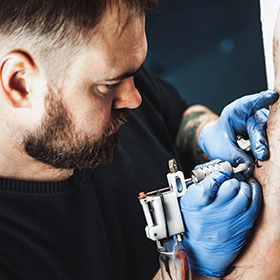Yes, nurses can have tattoos. But there are some rules to follow.
Tattoos are becoming more common in many professions, including nursing. While tattoos are often seen as personal expressions, the medical field has specific guidelines. Hospitals and clinics have different policies regarding visible tattoos. These policies can vary widely depending on the region, institution, and even the department within the hospital.
Understanding these rules is important for nurses who have or want tattoos. This blog will explore the factors that influence tattoo policies in nursing. We will look at the impact on patient care, professional appearance, and personal freedom. By the end, you will have a clear picture of what to expect if you are a nurse with tattoos or considering getting one.
Tattoos In Nursing
In the past, nurses with tattoos faced many challenges. Tattoos were often seen as unprofessional. Many hospitals had strict rules. Nurses had to cover their tattoos. This made it hard for some nurses. They had to wear long sleeves even in hot weather. Some nurses felt judged by their tattoos. It was a tough time for those with body art.
Today, attitudes toward tattoos have changed. Many hospitals are more relaxed about body art. Tattoos are more common now. Many people, including nurses, have them. Some hospitals still have rules. But these rules are not as strict as before. Nurses can often show their tattoos. This change makes many nurses happy. They can express themselves freely. Tattoos are now seen as a form of personal expression.
Workplace Policies
Nurses can have tattoos, but workplace policies vary. Some hospitals require tattoos to be covered. Other facilities may be more lenient.
Hospital Regulations
Many hospitals have rules about tattoos. Visible tattoos might need to be covered. Some hospitals allow small tattoos. Others are stricter. It depends on the hospital. Nurses should check the policy before starting a job. Tattoos should not be offensive. This is very important. Patients and staff should feel comfortable.
Clinic Guidelines
Clinics have their own rules. Smaller clinics might be more relaxed. Larger clinics might have strict rules. Some allow tattoos if they are not offensive. It is best to ask the clinic directly. Professional appearance is key. Tattoos should not distract patients. Nurses should always look neat and tidy.
Professional Image
Some people see tattoos as art. Others might think they look unprofessional. This can affect a nurse’s image. Patients may judge based on appearance. Older patients might have stronger views. Younger patients may be more open-minded. Tattoos can tell stories. They can show personality. Not everyone will understand the meaning. It is a personal choice. But it can impact how others see you.
Trust is key in nursing. Patients need to feel safe. Visible tattoos can affect this trust. Some patients might feel uneasy. They might think tattoos are unprofessional. Other patients may not care. First impressions matter. Nurses must build trust quickly. Tattoos can be a barrier. Or they can start a conversation. It depends on the patient. Respect and care are most important.
Legal Considerations
Many hospitals have rules about tattoos. Some places do not allow visible tattoos. Others have no rules. State laws can differ too. Some states protect workers with tattoos. Others do not.
Discrimination can happen at work. Some employers may not hire people with tattoos. They might think tattoos look unprofessional. This can be unfair. Workers should know their rights.
Cultural Sensitivity
Respecting diverse beliefs is very important. Some cultures see tattoos as negative. Others accept them as art. Nurses should be aware of these views. They should avoid showing tattoos that may offend. Small, hidden tattoos are usually fine. This way, they respect all patients.
Inclusive practices help in healthcare. Nurses with tattoos can still be professional. Hospitals can have clear policies. These rules help everyone. They make sure all staff look professional. They also respect cultural views. This balance is good for patient care.
Tattoo Coverage
Nurses can have tattoos, but policies vary by employer. Some hospitals require tattoos to be covered during work hours. Always check the specific guidelines of your workplace.
Uniform Policies
Many hospitals have strict uniform policies. These rules often require tattoos to be covered. Long sleeves and high-neck tops can help. Special makeup can also hide tattoos. Some hospitals are more relaxed about tattoos. They allow nurses to show them.
Cover-up Options
There are many ways to cover tattoos. Long-sleeve shirts are a good choice. Bandages can hide small tattoos. Skin-colored patches work well too. Some nurses use makeup to cover tattoos. It blends with the skin and hides the ink. Nurses must follow hospital rules. This keeps everyone happy.
Personal Expression
Nurses often seek ways to express themselves. Tattoos are a popular choice. But, they also need to look professional. Many hospitals have rules about visible tattoos. Some allow small, non-offensive ones. Others ask nurses to cover them up. It’s a balance between personal choice and work standards.
Tattoos can tell stories. They can show beliefs or art. Many nurses feel their tattoos are part of them. They want the freedom to show them. Yet, they must also respect their workplace rules. Understanding and respect on both sides help. It ensures harmony and professionalism.
Future Trends
Nurses with tattoos are becoming more common. Hospitals are shifting to more relaxed policies. Acceptance of body art is growing.
Evolving Policies
Hospitals are updating rules on tattoos. Policies now focus on tattoo visibility. Some places allow small, hidden tattoos. Others may permit larger ones if covered. Nurses must check their workplace rules.
Changing Attitudes
People’s views on tattoos are changing. Acceptance is growing. Many see tattoos as art. Patients may not mind tattooed nurses. Younger generations are more open to tattoos. This shift influences hospital policies.
Conclusion
Nurses can have tattoos, but policies differ by workplace. Some hospitals allow visible tattoos, while others require coverage. It’s essential to know your employer’s rules. Tattoos can express personality, but professionalism remains key. Patients’ comfort should always be considered. Research your workplace guidelines before getting a tattoo.
Nurses with tattoos can still provide excellent care. Stay informed and respect policies. This balance ensures a professional and inclusive environment.

